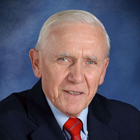Advancements & Achievements« Back to Advancements & Achievements Listings

How South Africa's Gordon Cragg has Protected Hope in the Global Battle against Cancer and HIV
By SABLE Staff
A South African organic chemist has emerged as one of the key collaborative figures in preserving the plants and creatures which may yet turn the tide against cancer and HIV/Aids.
Last year, Old Rhodian Dr. Gordon Cragg – the former Chief of the Natural Products Branch at the US National Cancer Institute (NCI) – received the ABC Norman R. Farnsworth Excellence in Botanical Research Award from the American Botanical Council. Cragg has already been widely recognized for his contribution to the development of the highly successful anticancer drug Taxol. But other recent accolades describe his broader contribution as that of a leading "research diplomat" who has helped build a framework for the protection and chemical investigation of biodiversity, through forging new partnerships with global institutions and developing countries.
For many lay people, the idea of the discovery of a cancer wonder drug from exotic plants would be derived from Sean Connery’s character in the movie "Medicine Man" – in which a lone, pony-tailed researcher makes his "eureka" discovery in the deep jungles of the Amazon. But in reality, Cragg says that beneficial drugs from natural products tend to be developed over years of collaborative work, which, in turn, depends on dedicated efforts in training and technology transfer, an enabling legal environment, and cooperative agreements on source collections.
And so, for many lab researchers who are engaged in the battle for effective cancer drugs, game-changing administrators like Cragg, Dr. Tom Mays, and others in the US and elsewhere are the unsung heroes. One Journal of Natural Products article noted that: "Cragg is renowned as a great scientist who has made, and continues to make, outstanding contributions to worldwide natural products' science, particularly in developing countries, encouraging research and collaboration."
Yet Cragg, himself, has been consistently reluctant to accept credit or acclaim for the immense gift he has helped wrap and set aside for countless generations to come. When the Journal of Natural Products dedicated its entire March 2012 edition to honor Cragg’s lifetime contribution, he commented: “There are many highly talented members of the natural products research community who thoroughly deserve this honor every bit as much, and far more, than I do, and I feel humbled.”
In a hint of good news for humanity, he told SABLE: "I remain very optimistic of a new wonder drug sourced from natural products."
Cragg said that – for instance - some of the most effective statins that save thousands of lives in the US today were based on a chemical sourced from a fungus discovered on a golf course in Japan. He added, "Over 60% of drugs are inspired in one way or another from chemicals isolated from nature, whether it’s from plants or microorganisms or marine organisms, so it’s incredibly important that biodiversity is preserved. An important aspect here is that many of the countries with rich biodiversity are emerging economies, which need to be incentivized to preserve that diversity. Although pharmaceutical companies have deemphasized natural products in the past 10 to 15 years, they still act as critical pathfinders."
Indeed, even a Medicine Man-type breakthrough is at least still possible thanks to these scientists-turned-administrators.
According to that same article by Dr. David Newman from NCI, Dr. Michael Davies-Coleman from Rhodes and others stated: "Gordon contributed immensely in aiding the development of recent natural product chemistry programs in Brazil, mainly in the northeast and southeast regions. In Brazil, he helped change the research scenario at the Universidade Federal do Ceará, located in Fortaleza, northeast Brazil. With a perception beyond his time, he organized the signing of a memorandum of understanding between the Federal University of Ceara and the Developmental Therapeutics Program of NCI in 2001. Furthermore, Gordon played a pivotal role in expanding the objectives of the Biota-FAPESP Program created in 1999, with the focus on biodiversity conservation and sustainable uses in Brazil." At the time, he was also President of the American Society of Pharmacognosy.
In 2006, The Missouri Botanical Garden conferred the prestigious William L. Brown Award for Plant Genetic Resources on Cragg – and named a new Madagascan plant species in his honor: Ludia craggiana. Bristling with "formidable thorns," it is precisely not the sort of plant that Cragg and his colleagues have explored over the past half-century. Alternatively, he says the plants and organisms that show promising pharmaceutical properties tend to be those with no obvious defensive features. "You get interested when you find a sea slug, for instance, with no apparent defense mechanism, and you note that predators don’t touch it," he says.
Cragg grew up in in the rural towns of Kroonstad and Alice – the son of a Methodist minister, who also studied science and taught theology to students of all colors. "My dad was very pro social justice, and very much ahead of his time in many areas," says Cragg. "He actually rose to become president of the Southern African Methodist Conference. My brother is also a church minister – so I’ve always seen myself as something of a black sheep!"
He says his first interest in medicinal plants began relatively late - while completing undergraduate studies in chemistry at Rhodes. “We were looking at wild dagga plant, which was used in traditional African healing – the beginning of my education about the deep importance of traditional knowledge systems with plants.” He completed his doctoral studies at Oxford in 1963, then pursued post-doctoral research at UCLA, and then returned to South Africa to join the Council for Scientific and Industrial Research followed by the chemistry faculty at UNISA, and later at UCT.
Cragg moved to the US more permanently in 1979 to join the Cancer Research Institute at Arizona State University, under Professor Bob Pettit. And, in 1985, he commenced what would become his long and rich career with the NCI – becoming Chief of its Natural Products Branch just four years later. One of his team’s first major biodiversity projects would prove iconic – contributing to the improvement in the lives of countless cancer sufferers.
Cragg told SABLE: “Taxol was derived from the bark of the Pacific yew tree, which grew in the Pacific North West – particularly in the Oregon area. It eventually proved to be very effective in the treatment of breast cancers and ovarian cancer and lung cancers. But there were very small yields from that bark, and we needed to find sustainable sources of the drug. The Pacific yew is an undistinguished-looking tree but contains some marvelous properties. A leading French chemist later investigated the needles of the European yew tree, and found them to include a chemical precursor, which was easily converted to the Taxol molecule.” According to journal reports, the bark of three entire Pacific yew trees – of an average diameter of 6 inches – was required for production of sufficient Taxol for a treatment course of a single patient.
Cragg says his team and their collaborators have also worked hard to protect other promising species, only to be disappointed later with negative results. For example: he says one rare vine which grew high in a Cameroon forest canopy – discovered by accident, when researchers came across a fallen tree – showed exciting initial properties in combatting the HI virus. “Unfortunately, as research progressed, the extract showed unacceptable levels of neurotoxicity,” he said. “Which is precisely why we need to preserve the broadest possible diversity out there.”
Cragg forged his most successful collaboration in 1963, while pursuing his post-doctoral studies at UCLA – where he met, and married Jacqueline Tuers in 1966. Jacqueline would go on to serve several US presidents as a librarian to the Executive Branch in Washington DC. The couple settled in Maryland, with each becoming a force in preserving critical knowledge and heritage in their respective fields.
He continues to work full weeks as an NIH Special Volunteer for the National Cancer Institute, writing reviews on new literature in the natural products research field – having already contributed some 170 articles and book chapters on the subject. He has also given public presentations to over 100 conferences and symposia worldwide.
This summer, Cragg also emerged as a key figure in a critical public campaign that circles back to his roots in South Africa – and which extends his long fight for the seeds of research excellence into a new realm. With his academic history anchored there – and ongoing collaborations with numerous alumni and partners – Cragg was alarmed to learn of serious proposals to strip Rhodes University of its famous name, and enduring brand.
On a circular released in March, Vice-Chancellor Sizwe Mabizela discussed claims by the SRC and others that: “There are those who are of the view that, given the horrendous things that Cecil John Rhodes did to the Black people in the Southern African region through his colonial and imperialist excesses, it is morally and ethically indefensible and completely unconscionable to have a university bearing his name.”
Echoing a growing chorus of objection among leading Old Rhodians and their global peers, Cragg has written and distributed a major essay in defense of the Rhodes brand – and in warning of dire consequences for any change.
In addition to illuminating parallels between Ceil Rhodes and the “robber barons” behind elite US universities like Stanford, Duke, Carnegie-Mellon and Vanderbilt – and the enduring benefits for students of retaining those brands – Cragg reveals key historical facts, including that Rhodes’ burial in 1902 was attended by Ndebele chiefs, who “for the first time, gave a white man the Matabele royal salute, Bayete.”
He warned: “To change the name will sever links to a name associated worldwide with world class academic excellence and scholarship, and will deny such prestige and advantages to future graduates. What’s more, I feel that any name change will amount to a sign of profound disrespect for the judgement, tolerance and wisdom of leaders such as the late President Mandela and past Rhodes Chancellor, Professor Jakes Gerwel, both honorary graduates of Rhodes University, who understood the need to put past history behind them, and look to constructive future progress.”

